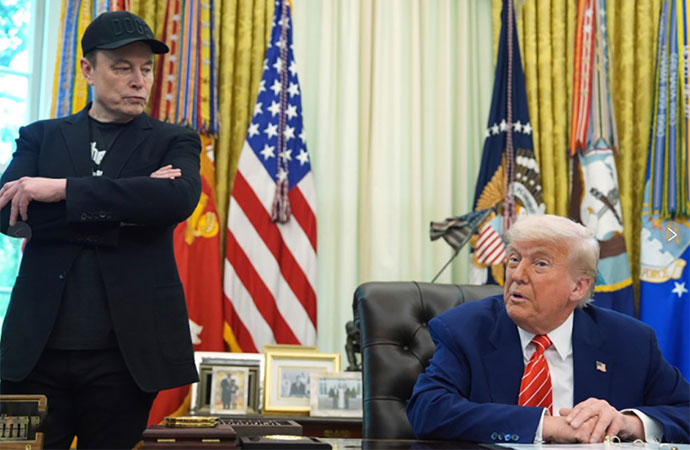Column

President Donald Trump is threatening to cut Elon Musk’s government contracts as their fractured alliance rapidly escalated into a public feud. AP/UNB
American President Donald Trump's politics of the theatre has produced several unforgettable characters, the enigmatic Elon Musk being the most memorable of them. Elon Reeve Musk is not just a businessman: Business might as well be called a Muskman, at least in the United States. Musk's combination of bold entrepreneurship, market acumen and discerning cultivation of political connections has enabled him to lead a charmed life as an American known for his leadership of household names such as Tesla, SpaceX and X (formerly Twitter). From freedom of the roads through self-driving cars (Tesla) to colonisation of space (SpaceX) and conquest of mindspace (X/Twitter), the South Africa-born businessman (or Muskman) has enriched the United States by migrating to it. He, too, has done very well. He has been considered the wealthiest person in the world since 2021; in May 2025, his net worth was estimated at $424.7 billion.
In the United States, Musk's gilded path crossed with that of Trump, another self-made billionaire. Musk's politically and financially enthusiastic support for Trump's successful second election campaign led him to head the Department of Government Efficiency (DOGE), the entity that Trump tasked with reducing US government spending and cutting jobs. Musk took a proverbial chainsaw to federal spending, emboldened by widespread public support in spite of legal challenges mounted over the scope of DOGE's work and criticism over a lack of transparency as well as inability to achieve national savings anywhere near declared goals.
Then the gods struck. CNN reported that after the Senate had narrowly passed a procedural vote to debate Trump's "Big, Beautiful Bill", Musk said that "he would use his vast resources to launch primary campaigns against Republicans in Congress who voted for the massive domestic policy agenda". Musk posted and re-posted messages that criticise the tax cut and spending bill, "particularly for its sky-high cost". Trump fought back, "suggesting his administration may investigate Musk's companies' massive government contracts". Trump said that Musk risked losing "a lot more" than government subsidies and warned that DOGE, which Musk himself had once led, might become a monster that would "go back and eat Elon".
This is riveting theatre. Two protagonists whom the dramatic stage brought together suddenly find themselves recast as protagonists. For Musk, Trump's Bill goes against his dramatic affiliation with his former friend; for Trump, Musk has forgotten that there is a lot more to American theatre than DOGE. That "more" is Trump himself. He is the chief actor. Musk cannot be more than Trump.
Things have come to such a pass that Trump is not averse to banning Musk from the stage itself. The reason: Musk appears to have departed from the theatrical script. According to an ABC report, "Musk, who has been floating the idea of creating a third political party for weeks in the wake of his split with the president, reignited the push over the weekend after the passage of Trump's sweeping tax cut and spending bill - which Musk railed against over its estimated impact adding trillions to the national debt. 'When it comes to bankrupting our country with waste and graft, we live in a one-party system, not a democracy,' Musk posted on X... 'Today, the America Party is formed to give you back your freedom.'" Trump reacted: "I think starting a third party just adds to confusion... It really seems to have been developed for two parties. Third parties have never worked, so he can have fun with it, but I think it's ridiculous." When asked by reporters if he would deport Musk, a South African national and naturalised US citizen, Trump said: "We'll have to take a look." In other words, the American stage is designed for two parties in the same play. Musk thinks otherwise. Clearly, the same stage cannot host two contrary plays at the same time. So, Musk will have to be exiled from the stage to perform his play, perhaps on the streets. Musk cannot exile Trump to the same fate.
To say that what we are witnessing is American theatre is not to suggest that these moves are contrived or orchestrated. I sincerely believe that Trump and Musk are people of conviction who also possess the financial and political means to implement their vision. They came together because they were drawn to the same theatrical plot: to Make America Great Again. However, the plot had no script except for the bare outlines that were present in Trump's manifesto. So, this was impromptu theatre. There was no director, no stage manager, no prompter, light technicians, no nothing. Actors made up the lines as they went along.
Now, the two chief actors have disagreed over the course of the plot and have parted ways.
Few partings are eternal. It is entirely possible that Trump and Musk will reconcile, stride the same stage again, and resume their roles in the American Play that brought them together. However, it is also possible that they will drift apart, each drawn to opposed strands of opinion in the audience that once watched their plays with awe, whether reverential or repulsed or simply frightened. Then, Trump's Republican and Musk's America parties might find themselves opposed by the Democrats, who acting abilities are unmatched. Then, the whole scene will change.
Taking centre-stage and banishing both Trump and Musk to the wings, the next Democratic actor-in-chief will hold the American audience's rapt attention.
There is no way of knowing how the plot of that play will unfold. But it will.
The writer is Principal Research Fellow of the Cosmos Foundation. He may be reached at epaaropaar@gmail.com

























Leave a Comment
Recent Posts
Pedaling Through the Mangroves ...
The journey from the bustling streets of Barishal to the serene, emera ...
Why the Interim Government mus ...
Two weeks out from what is expected to be a red letter day in the figh ...
Doesn’t matter who thinks what about Bangladesh deci ..
The Other Lenin
US President Donald Trump said his administration
Govt moves to merge BIDA, BEZA, BEPZA, MIDA